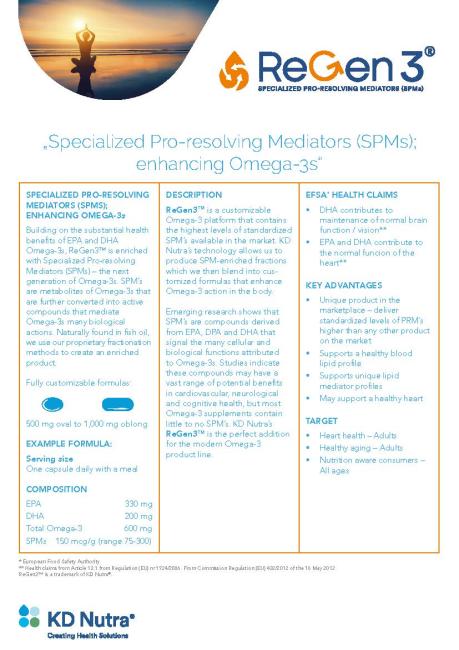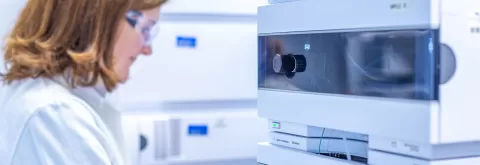很多疾病都会出现炎症,同时已对SPM在肺部感染和炎症、败血症、代谢紊乱、SARS-CoV-2、结直肠癌、肝病、精神疾病、神经退行性疾病和神经系统疾病中的作用进行了说明。 (Giacobbe et al., 2020; Han et al., 2021; Kwon, 2020; Lee, 2021; Mariqueo and Zúñiga-Hernández, 2020; Nijmeh and Levy, 2021; Ungaro et al., 2020; Yang et al., 2021)
同时,SPM也被描述为在小胶质细胞、星形胶质细胞和少突胶质细胞之间的通信者。这打开了新的免疫调节机制,可能为大脑稳态提供新的医疗目标(Tiberi and Chiurchiù, 2021)。
由SPM促进的炎症消解可保护组织免受持续或极端的损伤。这些损伤可能发展为慢性炎症,如肥胖、动脉粥样硬化和糖尿病。(Regidor et al., 2020)
炎症消解失败是导致由炎症驱动的疾病(例如,癌症和氧化应激相关的疾病模型)的关键病理机制。(Panigrahy et al., 2021; Ungaro et al., 2020; Wang et al., 2020)
SPM参与调节中性粒细胞的组织浸润,刺激巨噬细胞(免疫细胞)清除凋亡的中性粒细胞、细胞碎片和微生物,同时减少细胞因子的产生,从而消除炎症。
Giacobbe J, Benoiton B, Zunszain P, et al. (2020) The Anti-Inflammatory Role of Omega-3 Polyunsaturated Fatty Acids Metabolites in Pre-Clinical Models of Psychiatric, Neurodegenerative, and Neurological Disorders. Frontiers in psychiatry 11. Switzerland: 122. DOI: 10.3389/fpsyt.2020.00122.
Han Y-H, Lee K, Saha A, et al. (2021) Specialized Proresolving Mediators for Therapeutic Interventions Targeting Metabolic and Inflammatory Disorders. Biomolecules & therapeutics 29(5). Korea (South): 455–464. DOI: 10.4062/biomolther.2021.094.
Kwon Y (2020) Immuno-Resolving Ability of Resolvins, Protectins, and Maresins Derived from Omega-3 Fatty Acids in Metabolic Syndrome. Molecular nutrition & food research 64(4). Germany: e1900824. DOI: 10.1002/mnfr.201900824.
Lee CH (2021) Role of specialized pro-resolving lipid mediators and their receptors in virus infection: a promising therapeutic strategy for SARS-CoV-2 cytokine storm. Archives of pharmacal research 44(1). Korea (South): 84–98.DOI: 10.1007/s12272-020-01299-y.
Mariqueo TA and Zúñiga-Hernández J (2020) Omega-3 derivatives, specialized pro-resolving mediators: Promising therapeutic tools for the treatment of pain in chronic liver disease. Prostaglandins, leukotrienes, and essential fatty acids 158. Scotland: 102095.DOI: 10.1016/j.plefa.2020.102095.
Nijmeh J and Levy BD (2021) Lipid-Derived Mediators are Pivotal to Leukocyte and Lung Cell Responses in Sepsis and ARDS. Cell biochemistry and biophysics 79(3). United States: 449–459. DOI: 10.1007/s12013-021-01012-w.
Panigrahy D, Gilligan MM, Serhan CN, et al. (2021) Resolution of inflammation: An organizing principle in biology and medicine. Pharmacology & therapeutics 227. England: 107879. DOI: 10.1016/j.pharmthera.2021.107879.
Regidor P-A, Mueller A, Sailer M, et al. (2020) Chronic Inflammation in PCOS: The Potential Benefits of Specialized Pro-Resolving Lipid Mediators (SPMs) in the Improvement of the Resolutive Response. International journal of molecular sciences 22(1). Switzerland. DOI: 10.3390/ijms22010384.
Tiberi M and Chiurchiù V (2021) Specialized Pro-resolving Lipid Mediators and Glial Cells: Emerging Candidates for Brain Homeostasis and Repair. Frontiers in cellular neuroscience 15. Switzerland: 673549.DOI: 10.3389/fncel.2021.673549.
Ungaro F, D’Alessio S and Danese S (2020) The Role of Pro-Resolving Lipid Mediators in Colorectal Cancer-Associated Inflammation: Implications for Therapeutic Strategies. Cancers 12(8). Switzerland. DOI: 10.3390/cancers12082060.
Wang F, Huang S, Xia H, et al. (2020) Specialized pro-resolving mediators: It’s anti-oxidant stress role in multiple disease models. Molecular Immunology 126: 40–45.DOI: 10.1016/j.molimm.2020.07.017.
Yang A, Wu Y, Yu G, et al. (2021) Role of specialized pro-resolving lipid mediators in pulmonary inflammation diseases: mechanisms and development. Respiratory Research 22(1): 204.DOI: 10.1186/s12931-021-01792-y.
Protected by: US10653703B2, US11020406B2, US11559529B2, US11833158B2, US10568858B2, US11077084B2, US11285126B2.




